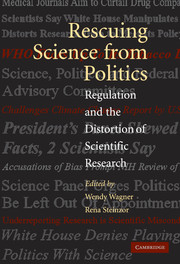Introduction: Principled Science
Published online by Cambridge University Press: 04 August 2010
Summary
Scientists under Attack
To the casual observer, scientists might appear to be the most influential group in the United States with respect to public health and environmental policy. Exhortations that we must use “sound science” to make decisions about whether to prevent potential risks are ubiquitous. No less an authority than a Supreme Court justice, as well as a wide range of other decision makers in the legislative, regulatory, and judicial arenas, have urged that scientists be elevated to the pinnacle of power, entrusted by the rest of us with the authority to resolve our most important and complex problems. Deference to scientists as the ultimate arbitrators of policy resonates every time Congress debates such controversies, suggesting that lawmakers and those who work to affect their decisions have nothing but respect for the sanctity and wisdom of the scientific process and its results, wherever they may lead us.
Why, then, do many scientists deployed at the front lines of the most heated disputes – over global warming, mercury in the human food chain, or the safety of antidepressants for adolescents – feel not like anointed and omniscient saviors, but instead like hunted prey? For all the lip service paid to the naïve but convenient notion that science has all the answers, the moment that researchers announce a discovery that has significant economic implications for industry or some other affected group, scientists in the spotlight quickly learn to run for cover.
- Type
- Chapter
- Information
- Rescuing Science from PoliticsRegulation and the Distortion of Scientific Research, pp. 1 - 20Publisher: Cambridge University PressPrint publication year: 2006
- 3
- Cited by

